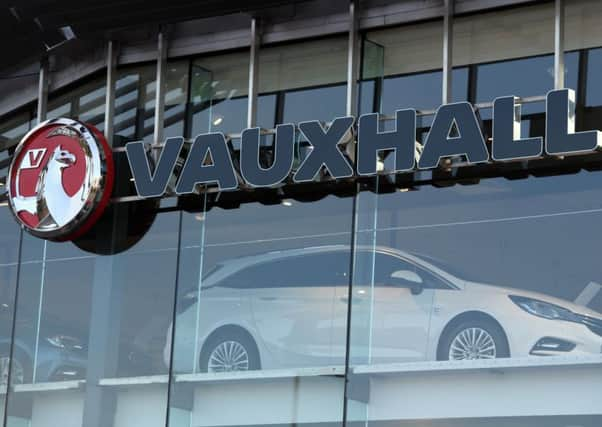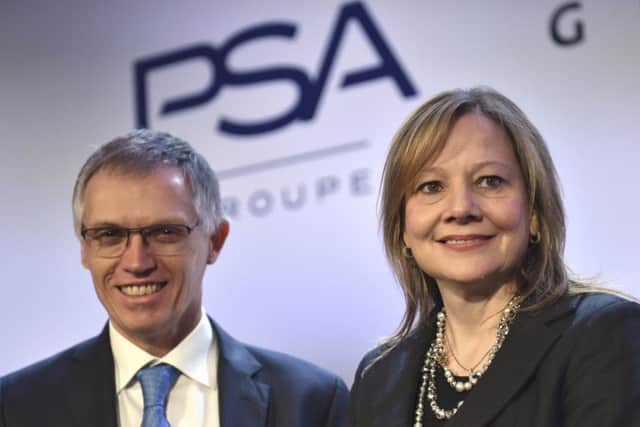New look for Europe's car manufacturing industry
This article contains affiliate links. We may earn a small commission on items purchased through this article, but that does not affect our editorial judgement.


Anyone visiting Vauxhall’s Ellesmere Port plant can be left in no doubt what is produced there. The words “Home of the Astra”, emblazoned across an enormous black and white hoarding, can be seen for hundreds of metres around.
Thousands of workers are employed at the Merseyside site building what has, for several decades now, been one of Britain’s best-selling family hatchbacks.
Advertisement
Hide AdAdvertisement
Hide AdFresh figures from the Society of Motor Manufacturers and Traders (SMMT), published yesterday, underlined that popularity, with the current generation Astra grabbing third place in the list of top sellers for February. Almost 2,200 of them were registered during what is traditionally one of the quietest months of the year for dealerships ahead of the March plate change, and adding to the hundreds of thousands that have rolled out of the sprawling plant over the years.


The industry figures coincided with the news that the French owner of Peugeot and Citroen had struck a near-£2 billion deal to buy General Motors’ European unit, which comprises the Vauxhall and Opel brands.
It’s a bumper deal that has naturally sparked concern among the 4,500 or so workers employed across Vauxhall’s manufacturing operations at Ellesmere Port and Luton, where the firm produces commercial vehicles. With commitments running for the next few years, unions will be hoping for new models to be announced to help secure the long-term future of the UK plants.
The takeover deal is also a political hot potato, coming amid a backdrop of Brexit negotiations, a weak pound and attempts to rebalance Britain’s economy away from its over-reliance on services and consumer spending.


Providing PSA Group’s swoop does not encounter any obstacles before completion, the enlarged firm would leapfrog its French rival Renault to become Europe’s second-ranked carmaker by sales, with a market share north of 16 per cent compared to Volkswagen Group’s 24 per cent. The German automotive giant racked up more than 3.8 million sales last year across its various brands, way ahead of both Renault and PSA.
The figures, from the European Automobile Manufacturers’ Association, show PSA had more than 1.85 million new car registrations in 2016. Most of them were Peugeot. In terms of European sales, General Motors’ car registrations last year totalled more than one million, the overwhelming majority of which were Opel, with Vauxhall in the UK. In the UK last year, Vauxhall was the biggest-selling brand after Ford, according to the SMMT. PSA Group had 177,418 new vehicles registered and now looks set to increase its market share, which, as of last year, stood at seven per cent.
However, while it looks poised to become the number two player in Europe, the value of the PSA Group as a brand is still outside the top ten car manufacturers in the world, according to a specialist valuation and strategy consultant.
Advertisement
Hide AdAdvertisement
Hide AdRobert Haigh, of Brand Finance, said: “We would expect the total value of the portfolio post-merger to be well in excess of $10bn [£8.1bn]. Given the cost savings and likely growth, this could easily be as high as $12bn.
“General Motors [GM] will see the value of its brand portfolio suffer a similar decline that will see it drop below Nissan and Ford. This doesn’t mean it is necessarily a bad idea for GM, however.
“They have clearly been unable to exploit the brand equity of Vauxhall and Opel as effectively as they would have liked, so freeing up cash to invest in other brands may be wise and will enable brand value growth in other areas of the business.”
Brand Finance, which takes into account factors such as investment in marketing, staff satisfaction and environmental performance as well as sales figures, ranked PSA 13th in the world, behind VW.
Haigh said value depends on both revenue and brand strength, adding: “Manufacturers of more expensive vehicles, such as Daimler and BMW, clearly have a higher revenue per car and so a higher brand value per car.”
Christian Stadler of Warwick Business School, a professor of strategic management who researches the car industry, said he expected job cuts and possible plant closures down the line.
“Whether this is a Vauxhaul/Opel plant or a Peugeot plant is hard to say at the moment,” he added. “The UK is definitely in a bad position as Brexit makes it less competitive than Germany and the unions are stronger in Germany.”
Stadler also noted: “Scale matters, particularly for mass market producers. It means that PSA can spread its R&D costs over a larger group and this should be helpful considering the substantial shifts the industry is experiencing in such areas as e-vehicles and self-driving cars.”
